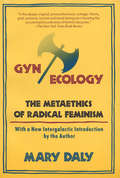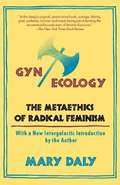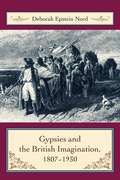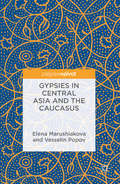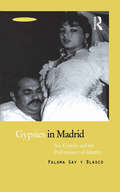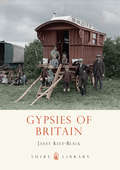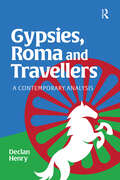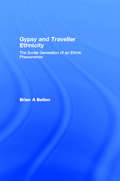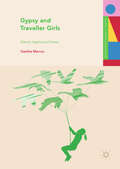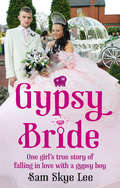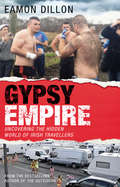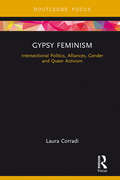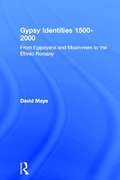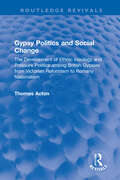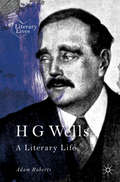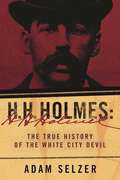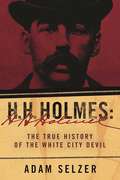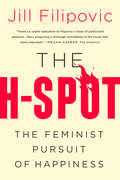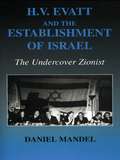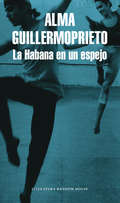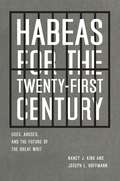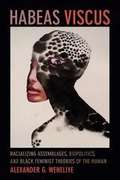- Table View
- List View
Gyn/Ecology: The Metaethics of Radical Feminism
by Mary DalyThis revised edition includes a New Intergalactic Introduction by the Author. <P><P>Mary Daly's New Intergalactic Introduction explores her process as a Crafty Pirate on the Journey of Writing Gyn/Ecology and reveals the autobiographical context of this "Thunderbolt of Rage" that she first hurled against the patriarchs in 1979 and no hurls again in the Re-Surging Movement of Radical Feminism in the Be-Dazzling Nineties.
Gyn/Ecology: The Metaethics of Radical Feminism, with a New Intergalactic Introduction
by Mary DalyIn this book Daly argues that men throughout history have sought to oppress women. She moves beyond her previous thoughts on the history of patriarchy to the focus on the actual practices that, in her view, perpetuate patriarchy, which she calls a religion.
Gypsies and the British Imagination, 1807-1930
by Deborah NordGypsies and the British Imagination, 1807-1930, is the first book to explore fully the British obsession with Gypsies throughout the nineteenth century and into the twentieth. Deborah Epstein Nord traces various representations of Gypsies in the works of such well-known British authors John Clare, Walter Scott, William Wordsworth, George Eliot, Arthur Conan Doyle, and D. H. Lawrence. Nord also exhumes lesser-known literary, ethnographic, and historical texts, exploring the fascinating histories of nomadic writer George Borrow, the Gypsy Lore Society, Dora Yates, and other rarely examined figures and institutions.Gypsies were both idealized and reviled by Victorian and early-twentieth-century Britons. Associated with primitive desires, lawlessness, cunning, and sexual excess, Gypsies were also objects of antiquarian, literary, and anthropological interest. As Nord demonstrates, British writers and artists drew on Gypsy characters and plots to redefine and reconstruct cultural and racial difference, national and personal identity, and the individual's relationship to social and sexual orthodoxies. Gypsies were long associated with pastoral conventions and, in the nineteenth century, came to stand in for the ancient British past. Using myths of switched babies, Gypsy kidnappings, and the Gypsies' murky origins, authors projected onto Gypsies their own desires to escape convention and their anxieties about the ambiguities of identity. The literary representations that Nord examines have their roots in the interplay between the notion of Gypsies as a separate, often despised race and the psychic or aesthetic desire to dissolve the boundary between English and Gypsy worlds. By the beginning of the twentieth century, she argues, romantic identification with Gypsies had hardened into caricature-a phenomenon reflected in D. H. Lawrence's The Virgin and the Gipsy-and thoroughly obscured the reality of Gypsy life and history.
Gypsies and the British Imagination, 1807-1930
by Nord Deborah EpsteinDeborah Epstein Nord traces the nearly ubiquitous British preoccupation with Gypsies in imaginative works by John Clare, Walter Scott, William Wordsworth, George Eliot, Arthur Conan Doyle, and D. H. Lawrence.
Gypsies in Central Asia and the Caucasus
by Elena Marushiakova Vesselin PopovThis book explores diverse communities living in Central Asia and the Caucasus, who are generally gathered under the umbrella term of ‘Gypsies’, their multidimensional identities, self-appellations and labels given to them by surrounding populations, researcher and policy-makers. The book presents various Gypsy and Gypsy-like communities and provides a comprehensive review of their history, demography, ways of life, past and present occupations, and contemporary migration in post-Soviet space. The authors situate these communities in historical settings and also in the wider context of contemporary evolving global and areal developments.The book will be of interest to scholars and students of history, sociology, social anthropology, nationalities studies, global and Central Asia and Caucasus areal studies, and Gypsy/Romani studies, and also for policy-makers and civic organizations.
Gypsies in Madrid: Sex, Gender and the Performance of Identity (Mediterranea #2)
by Paloma Gay y BlascoThroughout the twentieth century, Spanish people have deployed conflicting sexual moralities in their struggle for political supremacy within the state. The Spanish Gypsies or Gitanos, who live at the very bottom of the Spanish socio-economic scale, have appropriated this concern with gender morality and, in the process, have reinvented themselves as the only honourable Spaniards. Although the Gitano gender ideology has a distinctively Spanish flavour, it revolves around a conceptualization of the female body that is radically different from that of other Spaniards. The subtle exploration of these acts of cultural invention is one of the original features of this important new ethnography. Another even more striking aspect of the work is the author's vision of the 'impermanent' nature of the Gitano social order and the absence of any representation of 'community' or 'society'. Unlike their non-Gypsy neighbours, Gitanos do not use concepts of tradition, territory or social harmony as bases for their singularity. Instead, they focus on the evaluation of personal moral performances in the present. In a cultural universe where all activities are markers of shared identity, and where personhood is always sexed, men and women continually enact the superiority of Gypsies over non-Gypsies. Through dress, manner and the management of emations, or at wedding rituals where the virginity of young brides is put to the test, the body works as the site of these processes.
Gypsies of Britain
by Janet Keet-BlackThis title tells the story of the Romany Gypsies in Britain. Where they came from, how they arrived. It explores their travelling way of life and their traditional occupations, including harvesting, making baskets, dealing in horses, fortune telling and rat catching to royalty. Their impact on traditional museum dancing. It reveals their service as preachers and soldiers and their continuing contribution to life in Britain today.TOC: I: Origins /II: Lifestyle /III: Occupations /IV: Preachers and soldiers /V: Britain's Gypsies Today
Gypsies, Roma and Travellers: A Contemporary Analysis
by Declan HenryEssential reading for those who want to develop greater knowledge and awareness of the history, culture and lifestyles of GRT people.There are many misconceptions about the Gypsy, Roma and Traveller communities in the UK and Ireland. Little is understood of their culture and they are often marginalised by society. This book dispels many of the myths and gives a compassionate and empathetic view of the daily struggles they face including discrimination, racism and poverty. It also reviews criticisms directed at them and determines whether these are justified. Services are analysed to establish what works and what is weak. Packed with expert opinions from professionals working in the field and case studies and vignettes, garnered from personal interviews by the author with GRT people. Drawing from a wide range of perspectives from both inside and outside the respective communities, this book provides readers with all the key elements required to gain a deeper knowledge and understanding of these remarkable communities and their cultures.
Gypsy and Traveller Ethnicity: The Social Generation of an Ethnic Phenomenon
by Brian A BeltonThe book explores the notion of Gypsy and Traveller ethnicity and provides a critique of the conceptual basis of racial and ethnic categorisation. An analysis of the post-war housing situation is given in order to illustrate a connection between social and economic conditions, legislation affecting gypsies and travellers and the visibility and general consciousness of the gypsy and traveller population. The originality of the book lies in its argument that the position of gypsies and travellers largely arises out of social conditions and interaction rather than political, biological or ideological determinants. It puts forward the notion of an ethnic narrative of traveller identity and illustrates how variations of this have been defensively deployed by some travellers and elaborated on by theorists. Belton focuses on the social generation of travellers as a cultural, ethnic and racial categorization, offering a rational explanation of the development of an itinerant population that is less ambiguous and more informative in terms of the social nature of the gypsy and traveller position than interpretations based on 'blood', 'breed', 'stock', ethnicity or race that dominate the literature.
Gypsy and Traveller Girls: Silence, Agency and Power (Studies in Childhood and Youth)
by Geetha MarcusThis book presents the untold stories of Gypsy and Traveller girls living in Scotland. Drawing on accounts of the girls’ lives and offering space for their voices to be heard, the author addresses contemporary and traditional stereotypes and racialised misconceptions of Gypsies and Travellers. Marcus explores how the stubborn persistence of these negative views appears to contribute to policies and practices of neglect, inertia or intervention that often aim to ‘civilise’ and further assimilate these communities into the mainstream settled population. It is against this backdrop that the book exposes the girls’ racialised and gendered experiences, which impact on their struggles as young people to realise their potential and future prospects. Their narratives reveal the strengths of a distinct community, and the complexity of their silence and agency within the patriarchal structures that pervade the private spaces of home and the public spaces of education. This study also invites the reader to reflect on how the experiences of Gypsy and Traveller girls compares with young women from other social backgrounds, and questions if there is more that binds us than divides us as women in the modern world. Gypsy and Traveller Girls will be of interest to students and scholars across a range of disciplines, including sociology, education, gender studies and social policy.
Gypsy Bride: One girl's true story of falling in love with a gypsy boy
by Sam Skye Lee'I felt like Cinderella, Sleeping Beauty, Snow White and all the other fairy-tale princesses, and Pat was my Prince Charming.'Sam Skye Lee had often thought about getting married, but never imagined that her dress would be bright pink with flashing lights and weigh a staggering 20-stone. But then she didn't count on having a gypsy wedding...It's rare for a 'gorger', or non-traveller, to marry into the gypsy community. But after a shocking childhood tragedy, Sam found the comfort she needed from an unxpected source - Patrick and his family of travellers.Gypsy Bride is the heartwarming true story of how an ordinary girl finds herself discovering an extraordinary world. A place where 'grabbing' is a sign a boy fancies you, six-year-olds get spray tans, and christenings, weddings and funerals are jaw-droppingly flamboyant.This love story is more than boy meets girl. It's about a girl who falls in love with a whole race of people and their wonderful ways.
Gypsy Empire
by Eamon DillonIrish Travellers have never enjoyed a higher profile, at home and abroad, for good reasons and bad. On the one hand are the positive stories like the success of boxers such as John Joe Nevin and Tyson Fury, the popularity of Big Fat Gypsy Wedding and Paddy Doherty’s victory on Celebrity Big Brother. On the other are controversial news stories such as the Dale Farm stand-off and the recent convictions for slavery. Gypsy Empire delves into the heart of Traveller life, focusing on three aspects that have coloured perceptions of Travellers among the wider community: family feuds, bare-knuckle fights and trading. Many Irish Travellers are driven by the need to prove their status among their own, a powerful instinct epitomised by those who engage in brutal bare-knuckle fights. These bouts are fuelled by family feuds which sometimes erupt in vicious acts of violence. We meet many colourful characters, among them some of the world’s most prolific and gifted criminals, their self-reliance providing an edge over other crime gangs.This is a golden era for the Traveller clans which are expanding and growing like never before. Gypsy Empire takes the reader inside the hidden world of Irish Travellers.
Gypsy Feminism: Intersectional Politics, Alliances, Gender and Queer Activism (Routledge Advances in Sociology)
by Laura CorradiClumsy stereotypes of the Romani and Travellers communities abound, not only culturally in programmes such as Big Fat Gypsy Weddings, but also amongst educators, social workers, administrators and the medical profession. Gypsy cultures are invariably presented as ruled by tradition and machismo. Women are presented as helpless victims, especially when it comes to gendered forms of violence. The reality, however, is much more complicated. In Gypsy Feminism, Laura Corradi demonstrates how Romaphobia – racist and anti-Gypsy rhetoric and prejudice, pervading every level of society – has led to a situation where Romani communities face multiple discrimination. In this context, the empowerment of women and girls becomes still more difficult: until recently, for example, women have largely remained silent about domestic violence in order to protect their communities, which are already under attack. Examining feminist research and action within Romani communities, Corradi demonstrates the importance of an intersectional approach in order to make visible the combination of racism and sexism that Gypsy women face every day. This concise and authoritative book will appeal to scholars and students in the areas of Sociology, Cultural Studies, Women’s and Gender Studies and Anthropology, as well as Politics, Media Studies, Social Policy, and Social Work. It is also an invaluable resource for activists, community and social service workers, and policymakers.
Gypsy Identities 1500-2000: From Egipcyans and Moon-men to the Ethnic Romany
by David MayallGypsies have lived in England since the early sixteenth century, yet considerable confusion and disagreement remain over the precise identity of the group. The question 'Who are the Gypsies?' is still asked and the debates about the positioning and permanence of the boundary between Gypsy and non-Gypsy are contested as fiercely today as at any time before.This study locates these debates in their historical perspective, tracing the origins and reproduction of the various ways of defining and representing the Gypsy from the early sixteenth century to the present day. Starting with a consideration of the early modern description of Gypsies as Egyptians, land pirates and vagabonds, the volume goes on to examine the racial classification of the nineteenth century and the emergence of the ethnic Gypsy in the twentieth century. The book closes with an exploration of the long-lasting image of the group as vagrant and parasitic nuisances which spans the whole period from 1500 to 2000.
Gypsy Politics and Social Change: The Development of Ethnic Ideology and Pressure Politics among British Gypsies from Victorian Reformism to Romany Nationalism (Routledge Revivals)
by Thomas ActonThis book, first published in 1974, analyses the position of the Gypsies in Britain in the twentieth century, and assesses its significance in their overall history. Two dramatic shifts in Government policy towards the Gypsies are examined – in the 1880s and the 1960s – as are the changes in the stereotype of the ‘true Gypsy’. Dr Acton traces the developments of attitudes and economic conditions that gave rise to the 1970s increase in interest in Gypsies, and discusses the concomitant political and pressure group activity. He gives an account of the historical background to modern Gypsy politics; describes the postwar situation of the Gypsies in England and Wales, including pro-Gypsy pressure group activity up to 1965, and goes on to cover the campaigns of the Gypsy Council, including a sociological assessment of its work. He considers these aspects of Gypsy life in the light of modern sociological theory on minorities and race relations.
Gypsy Politics and Social Change: The Development of Ethnic Ideology and Pressure Politics among British Gypsies from Victorian Reformism to Romany Nationalism (Routledge Revivals)
by Thomas ActonThis book, first published in 1974, analyses the position of the Gypsies in Britain in the twentieth century, and assesses its significance in their overall history. Two dramatic shifts in Government policy towards the Gypsies are examined – in the 1880s and the 1960s – as are the changes in the stereotype of the ‘true Gypsy’. Dr Acton traces the developments of attitudes and economic conditions that gave rise to the 1970s increase in interest in Gypsies, and discusses the concomitant political and pressure group activity. He gives an account of the historical background to modern Gypsy politics; describes the postwar situation of the Gypsies in England and Wales, including pro-Gypsy pressure group activity up to 1965, and goes on to cover the campaigns of the Gypsy Council, including a sociological assessment of its work. He considers these aspects of Gypsy life in the light of modern sociological theory on minorities and race relations.
H G Wells: A Literary Life (Literary Lives)
by Adam RobertsThis is the first new complete literary biography of H G Wells for thirty years, and the first to encompass his entire career as a writer, from the science fiction of the 1890s through his fiction and non-fiction writing all the way up to his last publication in 1946. Adam Roberts provides a comprehensive reassessment of Wells’ importance as a novelist, short-story writer, a theorist of social prophecy and utopia, journalist and commentator, offering a nuanced portrait of the man who coined the phrases ‘atom bomb’, ‘League of Nations’ ‘the war to end war’ and ‘time machine’, who wrote the world’s first comprehensive global history and invented the idea of the tank. In these twenty-six chapters, Roberts covers the entirety of Wells’ life and discusses every book and short story he produced, delivering a complete vision of this enduring figure.
H. H. Holmes: The True History of the White City Devil
by Adam SelzerAmerica's first and most notorious serial killer and his diabolical killing spree during the 1893 World's Fair in Chicago, now updated with a new afterword discussing Holmes' exhumation on American Ripper.H. H. Holmes: The True History of the White City Devil is the first truly comprehensive book examining the life and career of a murderer who has become one of America’s great supervillains. It reveals not only the true story but how the legend evolved, taking advantage of hundreds of primary sources that have never been examined before, including legal documents, letters, articles, and records that have been buried in archives for more than a century. Though Holmes has become just as famous now as he was in 1895, a deep analysis of contemporary materials makes very clear how much of the story as we know came from reporters who were nowhere near the action, a dangerously unqualified new police chief, and, not least, lies invented by Holmes himself. Selzer has unearthed tons of stunning new data about Holmes, weaving together turn-of-the-century America, the killer’s background, and the wild cast of characters who circulated in and about the famous “castle” building. This book will be the first truly accurate account of what really happened in Holmes’s castle of horror, and now includes an afterword detailing the author's participation in Holmes' exhumation on the TV series, American Ripper. Exhaustively researched and painstakingly brought to life, H. H. Holmes will be an invaluable companion to the upcoming Martin Scorsese and Leonardo DiCaprio movie about Holmes’s murder spree based on Erik Larson’s The Devil in the White City.
H. H. Holmes: The True History of the White City Devil
by Adam SelzerShares with readers America’s first and most infamous serial killer and his diabolical killing spree during the 1893 World’s Fair in ChicagoThe first comprehensive book following the life and career of H. H. HolmesA fascinating true story about a dark moment in Chicago’s historyH. H. Holmes: The True History of the White City Devil uncovers not only the true story of Holmes but also how the legend evolved. It uses hundreds of primary sources that have never been studied before. This includes letters, articles, legal documents, and records that have been tucked away in archives for more than 100 years. While H. H. Holmes is now as famous as he was in 1895, a thorough analysis of modern materials clarifies how much of the story as we know it came from reports who were far from the action, an incredibly unqualified new police chief, and lies from Holmes himself. This book is a tale of an outlaw. It covers Holmes’s own story with new insights. The author, Adam Selzer, has uncovered stunning new data about Holmes. He combines turn-of-the-century America, the crazy group of characters who were in and around the famous “castle” building, and the killer’s own background. This book is the first fully accurate account of what truly happened in Holmes’s horror castle. H. H. Holmes, with its exhaustive research and careful detail, is an irreplaceable partner to the upcoming Leonardo DiCaprio and Martin Scorsese movie about Holmes’s murder spree based on Erik Larson’s The Devil in the White City.
The H-Spot: The Feminist Pursuit of Happiness
by Jill FilipovicWhat do women want? The same thing men were promised in the Declaration of Independence: happiness, or at least the freedom to pursue it.For women, though, pursuing happiness is a complicated endeavor, and if you head out into America and talk to women one-on-one, as Jill Filipovic has done, you see that happiness is indelibly shaped by the constraints of gender, the expectations of feminine sacrifice, and the myriad ways that womanhood itself differs along lines of race, class, location, and identity.In The H-Spot, Filipovic argues that the main obstacle standing in-between women and happiness is a rigged system. In this world of unfinished feminism, men have long been able to "have it all" because of free female labor, while the bar of achievement for women has only gotten higher. Never before have women at every economic level had to work so much (whether it's to be an accomplished white-collar employee or just make ends meet). Never before have the standards of feminine perfection been so high. And never before have the requirements for being a "good mother" been so extreme. If our laws and policies made women's happiness and fulfillment a goal in and of itself, Filipovic contends, many of our country's most contentious political issues-from reproductive rights to equal pay to welfare spending-would be swiftly resolved.Filipovic argues that it is more important than ever to prioritize women's happiness-and that doing so will make men's lives better, too. Here, she provides an outline for a feminist movement we all need and a blueprint for how policy, laws, and society can deliver on the promise of the pursuit of happiness for all.
H V Evatt and the Establishment of Israel: The Undercover Zionist (Israeli History, Politics and Society #Vol. 36)
by Daniel MandelThe Minister for External Affairs, and the dominant force in the formation of Australian foreign policy for a crucial decade in the battle over Palestine (1941-1949), Herbert Vere Evatt played a central role in the Australian political response to Zionism and the conflict in Palestine. This book, which uses a variety of primary sources from Australia, Israel, the United Kingdom and the United States, provides a valuable study of Evatt the Zionist, as well as illuminating a fascinating political figure. This valuable book charts the debate in Australia over the creation of a Jewish state as well as providing a genuinely entertaining study of Evatt himself.
"Ha ha," He Said. "Ha ha."
by Chuck KlostermanOriginally collected in Eating the Dinosaur and now available both as a stand-alone essay and in the ebook collection Chuck Klosterman on Film and Television, this essay is about sitcoms.
La Habana en un espejo
by Alma GuillermoprietoInscrita en la tradición de la obra de Joan Didion, V.S. Naipaul y Ryszard Kapuscinski, La Habana en un espejo aborda un tema político y social a través de la crónica, género por el que Alma Guillermoprieto, premiada en varias ocasiones, ha pasado a formar parte de los mejores escritores que tratan de cerca la situación actual de América Latina. En La Habana en un espejo Alma Guillermoprieto reconstruye una de las épocas más difíciles de su vida; formada en las mejores escuelas de baile de Nueva York, a los veinte años viaja a La Habana para impartir clases en la Escuela Nacional de Danza. La confrontación con el régimen castrista y el idealismo del pueblo cubano sacuden la conciencia política de la narradora, todo ello en una época en la que la revolución parecía ser la única solución a muchos problemas. La Habana en un espejo es la historia de la reivindicación de esta artista y una reflexión acerca de un régimen, y el resultado es un relato cargado de pasión y de ira en el que la autora consigue desmenuzar sus recuerdos con un pulso ágil y minucioso. Reseñas:«Una de las crónicas más astutas y elocuentes de la América Latina contemporánea. [...] Guillermoprieto hace una descripción íntima y conmovedora, dura e inteligente de la vida cotidiana durante la revolución.»San Francisco Chronicle «Un placer de lectura, repleta de humanidad, astucia, curiosidad y conocimiento.»The New York Times Book Review «La Habana en un espejo está escrita con elegancia. Captura el espíritu y los ritmos de Cuba durante un período de cambio dramático y agitación política.»Tucson Citizen
Habeas for the Twenty-First Century: Uses, Abuses, and the Future of the Great Writ
by Nancy J. King Joseph L. HoffmannFor centuries, the writ of habeas corpus has served as an important safeguard against miscarriages of justice, and today it remains at the center of some of the most contentious issues of our time—among them terrorism, immigration, crime, and the death penalty. Yet, in recent decades, habeas has been seriously abused. In this book, Nancy J. King and Joseph L. Hoffmann argue that habeas should be exercised with greater prudence. Through historical, empirical, and legal analysis, as well as illustrative case studies, the authors examine the current use of the writ in the United States and offer sound reform proposals to help ensure its ongoing vitality in today’s justice system. Comprehensive and thoroughly grounded in a modern understanding of habeas corpus, this informative book will be an insightful read for legal scholars and anyone interested in the importance of habeas corpus for American government.
Habeas Viscus: Racializing Assemblages, Biopolitics, and Black Feminist Theories of the Human
by Alexander G. WeheliyeHabeas Viscus focuses attention on the centrality of race to notions of the human. Alexander G. Weheliye develops a theory of "racializing assemblages," taking race as a set of sociopolitical processes that discipline humanity into full humans, not-quite-humans, and nonhumans. This disciplining, while not biological per se, frequently depends on anchoring political hierarchies in human flesh. The work of the black feminist scholars Hortense Spillers and Sylvia Wynter is vital to Weheliye's argument. Particularly significant are their contributions to the intellectual project of black studies vis-à-vis racialization and the category of the human in western modernity. Wynter and Spillers configure black studies as an endeavor to disrupt the governing conception of humanity as synonymous with white, western man. Weheliye posits black feminist theories of modern humanity as useful correctives to the "bare life and biopolitics discourse" exemplified by the works of Giorgio Agamben and Michel Foucault, which, Weheliye contends, vastly underestimate the conceptual and political significance of race in constructions of the human. Habeas Viscus reveals the pressing need to make the insights of black studies and black feminism foundational to the study of modern humanity.
